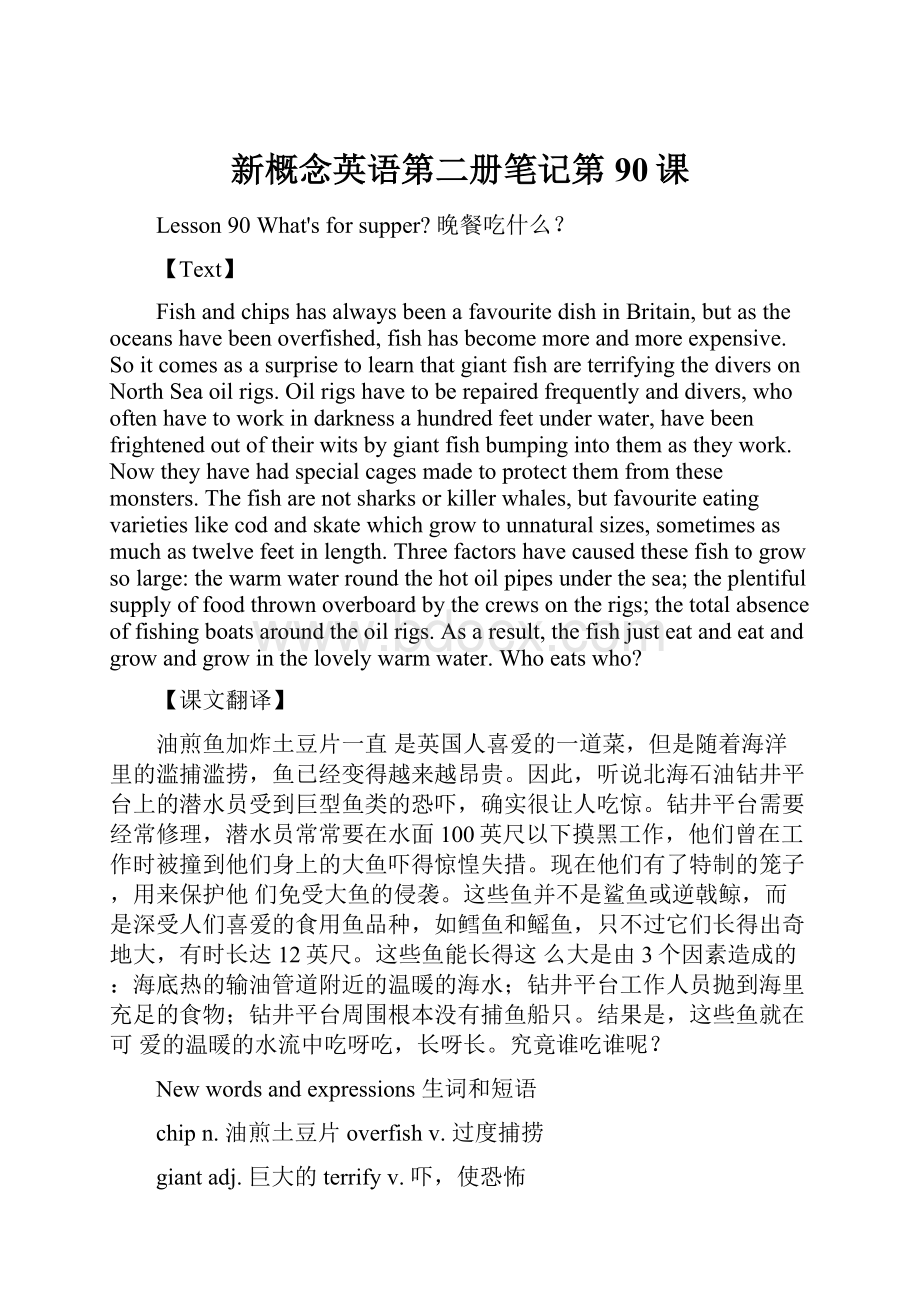新概念英语第二册笔记第90课.docx
《新概念英语第二册笔记第90课.docx》由会员分享,可在线阅读,更多相关《新概念英语第二册笔记第90课.docx(18页珍藏版)》请在冰豆网上搜索。

新概念英语第二册笔记第90课
Lesson90What'sforsupper?
晚餐吃什么?
【Text】
FishandchipshasalwaysbeenafavouritedishinBritain,butastheoceanshavebeenoverfished,fishhasbecomemoreandmoreexpensive.SoitcomesasasurprisetolearnthatgiantfishareterrifyingthediversonNorthSeaoilrigs.Oilrigshavetoberepairedfrequentlyanddivers,whooftenhavetoworkindarknessahundredfeetunderwater,havebeenfrightenedoutoftheirwitsbygiantfishbumpingintothemastheywork.Nowtheyhavehadspecialcagesmadetoprotectthemfromthesemonsters.Thefisharenotsharksorkillerwhales,butfavouriteeatingvarietieslikecodandskatewhichgrowtounnaturalsizes,sometimesasmuchastwelvefeetinlength.Threefactorshavecausedthesefishtogrowsolarge:
thewarmwaterroundthehotoilpipesunderthesea;theplentifulsupplyoffoodthrownoverboardbythecrewsontherigs;thetotalabsenceoffishingboatsaroundtheoilrigs.Asaresult,thefishjusteatandeatandgrowandgrowinthelovelywarmwater.Whoeatswho?
【课文翻译】
油煎鱼加炸土豆片一直是英国人喜爱的一道菜,但是随着海洋里的滥捕滥捞,鱼已经变得越来越昂贵。
因此,听说北海石油钻井平台上的潜水员受到巨型鱼类的恐吓,确实很让人吃惊。
钻井平台需要经常修理,潜水员常常要在水面100英尺以下摸黑工作,他们曾在工作时被撞到他们身上的大鱼吓得惊惶失措。
现在他们有了特制的笼子,用来保护他们免受大鱼的侵袭。
这些鱼并不是鲨鱼或逆戟鲸,而是深受人们喜爱的食用鱼品种,如鳕鱼和鳐鱼,只不过它们长得出奇地大,有时长达12英尺。
这些鱼能长得这么大是由3个因素造成的:
海底热的输油管道附近的温暖的海水;钻井平台工作人员抛到海里充足的食物;钻井平台周围根本没有捕鱼船只。
结果是,这些鱼就在可爱的温暖的水流中吃呀吃,长呀长。
究竟谁吃谁呢?
Newwordsandexpressions生词和短语
chipn.油煎土豆片overfishv.过度捕捞
giantadj.巨大的terrifyv.吓,使恐怖
divern.潜小员oilrig石油钻塔
witn.(复数)理智,头脑cagen.笼
sharkn.鲨鱼whalen.鲸
varietyn.品种codn.鳕
skaten.鳐factorn.因素
crewn.全体工作人员
【生词讲解】
1.chip
1)n.油煎土豆片(英:
potatochip/crisp)
(细长的)油炸马铃薯条(美:
Frenchfry)
2)碎片、木碎片
haveachiponone’sshoulder(口)心情不好、性好争吵
achipofftheoldblock(口)酷似父亲的儿子、一个模子印出来的,酷似
2.overfishv.过度捕捞
overcropv.因过度的耕种而使土地贫瘠
overdov.做得过分,过度,夸张
overdrawvt.透支,拉过度,夸大
overdressv.(使)过度打扮,穿着太考究
overeatvi.吃过量
3.giant
1)adj.巨大的
agiantcorporation一个大公司
giantpandan.大猫熊,大熊猫
2)n.(故事或传说等)巨人、大汉(相反:
dwarf矮子)
eg:
Jacksawthegiantclimbingdownthebeanstalk.
杰克看到巨人爬下豆茎。
3)n.伟人、大人物
giantsinthefieldofelectronics电子行业之牛耳.
4.terrifyv.吓,使恐怖、使受惊吓
beterrifiedof害怕...,恐惧...
eg:
Thechildrenwereterrifiedofbeingscolded.
孩子们害怕被骂。
terrifysb惊吓某人、威胁(某人)
eg:
Hissuddenappearanceterrifiedthem.
他的突然出现,吓坏了他们。
beterrifiedby/beterrifiedat被……吓一跳
eg:
Theywereterrifiedbyhissuddenappearance.
=Theywereterrifiedathissuddenappearance.
他的突然出现使他们都吓坏了。
terrifyingadj.可怕的
terrified['terifaid]adj.恐惧的,受惊吓的
5.divern.潜小员、跳水选手
dive [daiv]n./vi.跳水,潜水;俯冲,扑
divefromthebridgeintotheriver从桥上跳入河中
diverfor(为寻找或取……)潜水
eg:
Theydiveddownforoysters.
他们潜水去捞牡蛎
diveinto(突然)投入,跳入、潜心研究
eg:
HedivedintothehistoryofChina.
他潜心研究中国的历史。
6.oilrig石油钻塔
oil
1)n.油cookingoil食用油
hairoil发油;heavyoil重油;lightoil轻油
2)n.油画颜料
paintinoils油画油;burnthemidnightoil开夜车
pouroilontheflamevi.火上加油
3)v.在…….注(涂)油
oilaclock给钟加油
oilone’shand=oilone’spalm行贿
oilthewheels(用会赂手段等)使事情进展顺利
rig
1)n.(船)配备、设备,钻探设备
2) v.给(船)上配备、打扮、装束
7.wit
1)n.(复数)理智,头脑(wits)
eg:
Hehasquickwits.
他反应敏锐
eg:
Helackedthewitstoseewhattodointheemergency.
他当时缺少临机应变的能力。
2) 机智、聪明(u)
eg:
Hisessayssparkledwithwit.
他的散文才气洋溢。
eg:
Hisspeechwasfullofwitandhumor.
他的演讲充满了机智和幽默。
atone’swits’end 智穷计尽
haveone’switsabout=keepone’switsabout
头脑冷静;保持警觉;精明;足智多谋
livebyone’swits 靠小聪明过日子
outofone’swits失去理智
8.shark
1)n.鲨鱼
2)n.(口语) 骗子、贪得无厌的人、放高利贷者
9.whalen.鲸
eg:
Thewhaleisthelargestofallanimals.
所有动物鲸是最大的。
awhaleof(口) 极好的、巨大的
haveawhaleofatime过美好的时光
10.variety[vəˈraiəti]n. 多样化
←→monotony [məˈnɔtəni] n.单调
alifefullofvariety 丰富多彩的生活
forvariety’ssake 为不单调起见,为了有所变化
avarietyof 种种,多种多样的
eg:
Thereareawidevarietyofpeopleontheearth.地球上有各种不同的人。
varietyshow(英)综艺节目
varietystore(美)杂货店(以低价出售日常品及其他杂货的店铺)
variousadj.
1)形形色色的、种种的
representativesfromvariouscountries来自各国的代表
variousexperiences种种经验
2)许多的、好几个的(无比较级的变化)
forvariousreasons因种种理由
variation[ˌveəriˈeiʃən]n.变化,变动;变体,变种;变奏(曲)
variationsoftemperature温度的变化
11.codn.鳕鱼
C.O.D.n.(=cashondelivery)货到付款
12.skate
1)n.鳐鱼
2)v.溜冰、滑冰
eg:
Iwanttogoskatingtomorrow.
我想明天去溜冰
3)n.溜冰鞋 iceskate;rollerskate旱冰鞋
13.factor
1)n.(造成某结果的)因素、要素
themainfactorthatcauseddispute 造成纠纷,的主要因素,
eg:
Honestyisonefactorforhissuccess.
诚信是他成功的因素之一。
2)n.因子、因子
14.crew
n.(船、飞机、火车等的)全体工作人员(集体名词)
eg:
Thecrewislarge.
工作人员很多。
eg:
Thecrewofthejetare30inall.
全体机组人员总共是30个。
eg:
Theplanehadseventypassengersandacrewoften.
这架飞机有七十名乘客,10名机组人员。
crewcut小平头 ; crewneck圆领毛衣
【课文讲解】
1.FishandchipshasalwaysbeenafavoritedishinBritain,butastheoceanshavebeenoverfished,fishhasbecomemoreandmoreexpensive.
※fishandchips油煎鱼加炸土豆片,英国的一种家常菜,被看做是一盘菜,因此用单数动词;
而JaneandKeithhavealwaysbeengoodfriendsofours 谓语动词为havebeen.
用and相连的名词看成一个整体时,谓语动词用单数形式;如果把他们看成分开的部分,动词就用复数形式;如上句。
※ moreandmore越来越
eg:
Thespectatorsgotmoreandmoreexcited.
观众们越来越兴奋。
eg:
Moreandmoredoctorshavebeguntousethenewmedicine.
越来越多的医生使用这种新药。
※1)dish在这里指“一盘菜”或“菜肴”、“食品”:
eg:
IlikeFrenchdishes.
我喜欢(吃)法国菜。
eg:
Wouldyoulikeasweetdish?
您要一盘甜食吗?
2)thedishes餐具
3)常用于口语,用做单数,帅气的意思
eg:
Mary'snewboy-friendisquiteadish,isn'the?
Mary新交的男朋友挺帅的,是不是?
4)dishthedirt揭短,揭疮疤
eg:
Journalistsdishedthedirtaboutthisfamoussinger.
记者们揭了这个著名歌星的疮疤。
5)dishout大量分发
eg:
Therearemanypeopledishingoutleafletstopassers-by.
有很多的人正在向路人分发传单。
2.SoitcomesasasurprisetolearnthatgiantfishareterrifyingthediversonNorthSeaoilrigs.
※itcomestolearnthat听说
NorthSea北海
※terrify,frighten,fear和scare的区别
※frighten最普通,没有特殊的意义,仅表示"吓唬"或"使……害怕";scare在口语中与frighten可以通用,但是在文学作品中,总是用它表示"把某人吓跑";scare还表示恐吓,实际并没有发生的事情。
terrify指"使(某人)感到恐怖",受到这种惊吓的人是不能自制的。
语气最强烈.Fear当我们害怕某种东西而而产生的一种害怕感觉。
1)terrify使某人害怕,感到恐怖
eg:
Heterrifiedthechildrenwithghoststories.
他用鬼故事来吓孩子们。
2)Youscaredme!
吓我一跳!
3.Oilrigshavetoberepairedfrequentlyanddivers,whooftenhavetoworkindarknessahundredfeetunderwater,havebeenfrightenedoutoftheirwitsbygiantfishbumpingintothemastheywork.
※1)befrightenedoutoftheirwits被吓晕了、被吓得惊惶失措
(befrightened/scaredtodeath/outofone'swits某人被吓得要死)
eg:
Thechildrenarefrightened todeathbythethunderstorm.
孩子们让雷雨吓得要命。
2)outofone'swits表示“失去理智”、“惊慌失措”:
eg:
Shewasfrightenedoutofherwitsbythegreatfire.
大火吓得她惊慌失措。
eg:
Areyououtofyourwits?
(Areyououtofyourmind?
)
你疯了吗?
3)bumpinto的含义之一是“碰上”、“撞上”:
bumpagainst/intosth与某物相撞
eg:
Ibumpedintoachairindarkness.
我在黑暗中碰到了椅子。
eg:
Wanderingindarkness,thedrunkbumpedintoapoliceman.
那醉汉在黑夜中闲荡时撞到了一个警察的身上。
eg:
Isawthetaxibumpintoaparkedcar.
我看到出租车撞上一辆停着的汽车。
bumpinto也可以表示“偶然遇见”、“碰见”(多用于口语):
eg:
GuesswhoIbumpedintotoday?
你猜我今天碰到谁了?
eg:
IbumpedintoJaneattheconference.
我开会时碰见了简。
4.Nowtheyhavehadspecialcagesmadetoprotectthemfromthesemonsters.
※ havesthdone=getsthdone让别人做某事=asksbtodosth
havehad...made是使役式的完成式。
(cf.第66课语法)
have作为完全动词还可以构成使役式,其形式为:
have+名词或宾格代词+动词的过去分词。
由于have是完全动词,所以其疑问句与否定句由do/did构成。
与被动语态相似,使役式着重表示的是对某物(或某人)做了什么而不是某人做了什么。
用被动语态或使役式时,我们可能不知道或认为不必指明为我们服务的人是谁。
然而,使役式比被动语态更加强调“使”别人为我们服务这一事实。
我们要表示让别人为我们做某事时,通常不用主动语态。
让别人给理发时,不可说Iwanttocutmyhair而要说Iwanttohavemyhaircut。
eg:
I'mhavingmycarrepaired.
我正在让别人修理我的汽车。
(使役式的进行式)
eg:
Didshemendthetypewriterherself?
No,shehaditmendedintown.
是她自己修理打字机的吗?
(主动语态)
不,她让别人在城里修的。
(使役式)
eg:
Howniceyourcarlooks!
Thankyou.I'vejusthaditwashed.
你的车看上去真漂亮!
谢谢。
我刚让人洗过。
(使役式的完成式)
eg:
You'llneedsomewarmclothesforthejourney.
I'llhavesomenewclothesmadenextweek.
这次出去旅行你需要带一些暖和的衣服。
我下周就让人做几件。
(使役式的将来式)
※protect……..from=protect…against
eg:
Heiswearingsunglassestoprotecthiseyesfromthestrongsunlight.
他戴着太阳镜保护眼睛免受强光伤害。
eg:
Hetriedtoprotectthechildfromtherain/thedog.
试图使孩子不被雨淋/狗咬。
eg:
Thiscoatwillprotectyouagainstthecold.
这件大衣可以给你御寒。
5.Thefisharenotsharksorkillerwhales,butfavoriteeatingvarietieslikecodandskatewhichgrowtounnaturalsizes,sometimesasmuchastwelvefeetinlength.
※fish:
squid鱿鱼goldfish金鱼carp鲤鱼crucian鲫鱼scales鱼鳞fins鳍
gill鳃frozenfish冻鱼smokedfish熏鱼freshfish鲜鱼boiledfish煮鱼
friedfish煎鱼grilledfish烤鱼
※favouriteeatingvarieties,深受人们喜爱的食用的品种。
eating在这里为形容词,表示“供食用的”,它有时也表示“宜生食的”:
eg:
Eatingcornisquitesweet.
食用玉米很香甜。
eg:
Theseareeatingapples,andthosearecookingapples/ones.
这些是生吃的苹果,那些是烹任用的苹果。
eatupyourdinner.吃完你的饭!
※asmuchas像……一样(最大限度)数词+量词+in+名词
asfaras+从句
eg:
ThisisasfarasIcandrink.
我再也不能喝了。
not...but... 不是……而是……
※twelvefeetlong这条鱼有13英尺长。
thirteenfeethigh
thirteenfeetwide
Thefishistwofeetinlength.
Thefishisonefeetinwidth
Thefishisonefeetinheight
6.Threefactorshavecausedthesefishtogrowsolarge:
※causefor/tosth理由,缘故(直接原因)
eg:
Youhavenocauseforcomplaint/Youhavenocausetocomplaint.
你没有理由抱怨
eg:
Drivingtoofastmaycauseanaccident.
开车太快会引起事故。
eg:
Sheisneverabsentfromworkwithoutgoodcause.
她决不无故缺勤。
v.造成(某事物)......
eg:
Thecoldweathercausedtheplantstodie.
天气寒冷冻死了植物。
eg:
She'salwayscausingtroubleforpeople.
她总是给人添麻烦。
eg:
Thiscarcausedmealotoftrouble.
这辆车给我带来许多麻烦。
causesbtodosth:
导致某人做某事
eg:
Illnesscausedhimtolosehistemper.
疾病使他发脾气。
eg:
Hisillnesscausedhimtomissthegame.
他因病不能参加比赛。
causesth.tosb./forsb.给某人带来……
eg:
Heoftencausestroubleto/forpeople.
cause:
强调事情发生的直接原因
reas